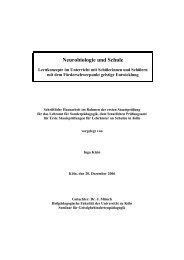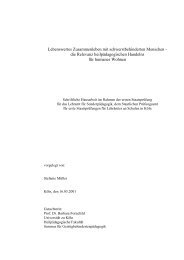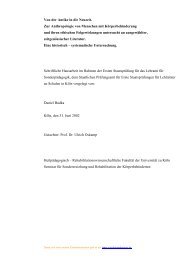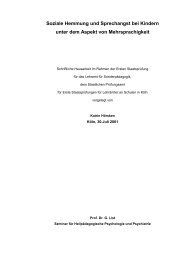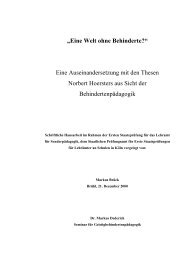Heilpädagogik online - sonderpaedagoge.de!
Heilpädagogik online - sonderpaedagoge.de!
Heilpädagogik online - sonderpaedagoge.de!
Sie wollen auch ein ePaper? Erhöhen Sie die Reichweite Ihrer Titel.
YUMPU macht aus Druck-PDFs automatisch weboptimierte ePaper, die Google liebt.
American Pragmatism, Sociology and the Development of Disability Studies<br />
theoretical and experiential un<strong>de</strong>rstanding of what it means to be a<br />
disabled person.<br />
Social interactionism is well equipped to analyze how social<br />
problems, behavior and institutions are socially constructed. As<br />
ROBERTSON (1977: 135) aptly remarks, “We are not born with any<br />
sense of time, of place, or cause and effect, or of the society in<br />
which we live. We learn about these things through social interaction,<br />
and what we learn <strong>de</strong>pends on the society in which we live<br />
and our particular place within it.” According to BERGER and<br />
LUCKMAN (1963), reality is socially constructed through three<br />
processes: externalization, objectification and internalization.<br />
Externalization occurs when people produce cultural products<br />
through their social interactions. Examples of this in the disability<br />
arena are lip reading and signing among <strong>de</strong>af people and group<br />
cohesion among spinal cord injured individuals due to the visibility<br />
of and meanings attached to wheelchair use. Objectification occurs<br />
when these externalized products take on a meaning of their own.<br />
For example, the wheelchair symbol is used worldwi<strong>de</strong> to <strong>de</strong>note<br />
parking spaces and bathrooms that are inten<strong>de</strong>d to be accessible<br />
for disabled people. Internalization takes place when people learn<br />
purported “objective” facts about reality from others through the<br />
socialization process and make them a part of their own subjective<br />
“internal” consciousness. Thus, individuals socialized in similar<br />
cultures share the same perceptions of reality, rarely questioning<br />
where these beliefs originated or why. Stigmatization of and<br />
attitu<strong>de</strong>s towards persons with mental illness are an example of<br />
such an internalization process.<br />
Within this intellectual tradition, Irving Kenneth ZOLA ma<strong>de</strong> a<br />
substantial contribution to the <strong>de</strong>velopment of disability studies as<br />
- 37 -<br />
Heilpädagogik <strong>online</strong> 03/ 03



